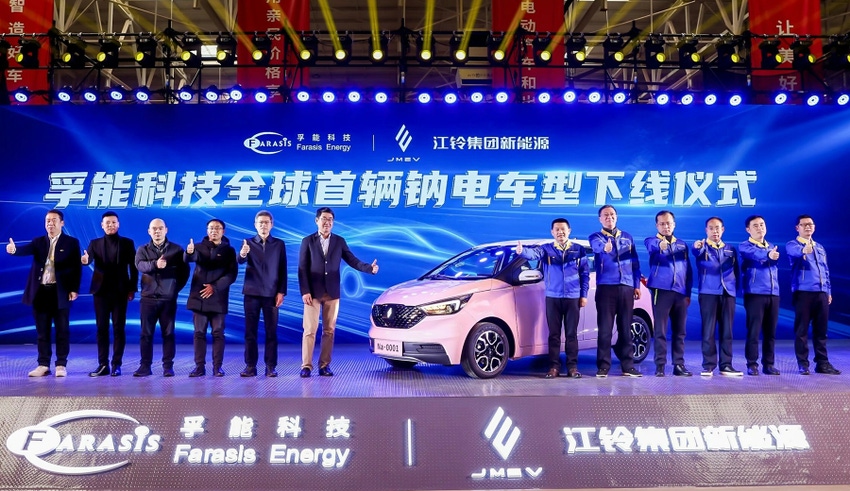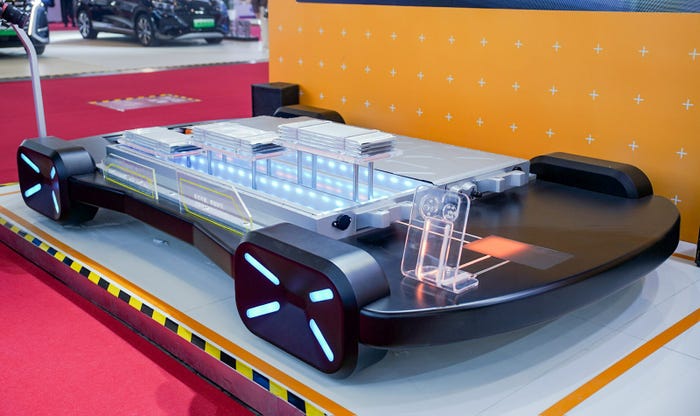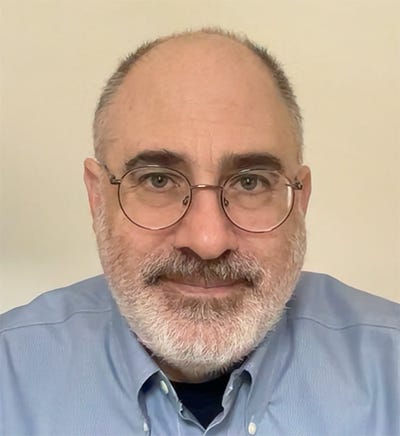Farasis Energy’s Sodium-Ion Batteries Appear in First EV
China’s No. 9 EV battery manufacturer also shows Super Pouch Solution system in which semi-solid pouch cells are installed directly in EV chassis.
February 28, 2024

In a milestone for the electric vehicle (EV) industry, the world’s first EV powered by Farasis Energy’s sodium-ion batteries rolled off the production line in January.
The JMEV EV3 (Youth Edition) was produced at JMEV’s plant in Nanchang on Dec. 28. With a range of 251 kilometers (156 miles), the vehicle is the first A00-class EV to use the new Farasis batteries, which feature:
Energy density of 140 to 160 Wh/kg
Low-temperature performance that retains over 91% discharge capacity at minus 20 degrees C. (minus 4 degrees F)
A battery pack that complies with the no thermal runaway standard
Layered oxides and hard carbon
Prussian blue analogues and polyanionic compounds
Farasis is also preparing to launch its second-generation sodium-ion batteries this year, with energy density of 160 to 180Wh/kg. And, the company projects it will achieve energy density of 180 to 200Wh/kg in these batteries in 2026. Seeking markets and applications, Farasis is extending partnership opportunities with AOO-class micro EVs, electric two-wheelers, battery-swapping services and ESS.
Meanwhile, Farasis showed off its other innovations—its Super Pouch Solution (SPS), eVTOL battery technology, portable power stations and high-performance motorcycle battery systems—at the first China International Supply Chain Expo in December.
SPS benefits
SPS in particular is meant to optimize charging efficiency while reducing operating costs and improving performance for multiple types of EVs. SPS is a battery system in which semi-solid pouch cells are installed directly in the chassis. The Farasis SPS offers: [bullets follow]
High energy density exceeding 220Wh/kg, for driving range over 1,000 kilometers (621 miles) thanks to its nonmodular horizontal layout, which increases energy density 30%.
Advanced cell design, incorporating advanced stacking and lightweight aluminum plastic film encapsulation to increase energy density by more than 10% over traditional prismatic and cylindrical batteries.
Rapid charging and discharging powered by the company’s 800VTC (Turbo Charge) technology, which can achieve 400 kilometers (249 miles) range in 10 minutes.
More efficient design that is 20 to 30 kilograms lighter than traditional battery systems and saves 33% in material costs.
Safer operation thanks to an AI-driven battery management system.

Super Pouch Solution (SPS). Image courtesy of Farasis Energy.
Working to gain momentum
Farasis is the creation of battery scientists Dr. Yu Wang and Dr. Keith Kepler, who founded the company in California in 2002. Beginning in 2009 by supplying battery systems for electric motorcycles in China, Farasis made its first foray into the country’s automotive industry in 2016. Farasis went public in July 2020, on Shanghai’s Star Market.
As of August 2023, Farasis was the ninth-largest battery manufacturer in China and had received a significant boost to its expansion and financing capabilities thanks to Guangzhou Industrial Investment Holding Group planning to become the company’s controlling shareholder.
In the first six months of 2023, Farasis produced 1.9 gigawatt hours (GWh) of batteries in China—good enough for a 1.2% share of the market—according to an Aug. 2 report by Yicai Global.
In November, Guangzhou announced it would alter its plans to acquire its controlling stake in Farasis to ensure the interest of the battery maker’s founders, Yicai Global reported. The deal replaced the earlier agreement.
In December, a leadership change announced for Farasis Energy Europe, which will see Marcel Broemlage assume the role of general manager beginning Feb. 1. Broemlage is to report to Feng Zhang, vice president of the company’s overseas business unit. Joining Farasis in November 2020, Broemlage served as head of operations for the company in the U.S. and Europe.
“In his role as general manager at Farasis Energy Europe, Marcel Broemlage will actively shape our growth strategy and strengthen the company’s position as one of the leading providers of battery solutions for electric vehicles,” Zhang explained. “Our goal is to leverage our global Farasis network and take it to the next level.”
145 GWh by 2025
By 2025, Farasis is aiming to produce 145 GWh of capacity annually, the company said. To that end, Farasis and Turkish mobility company Togg entered into a joint venture, called Siro, to build battery modules and packs at a production facility in Gemlik, Turkey. Production began March 31 with initial annual capacity of 3 GWh. Annual capacity is projected to expand to 20 GWh by 2031. This adds to capacity from Farasis production facilities in China, in Ganzhou and Zhenjiang.
In addition to building up capacity, Farasis is pursuing research to increase the safety of EVs. On Jan. 18, the company announced that it is part of a consortium that includes Kautex Textron, a supplier of energy storage systems, and the Fraunhofer Institute for High-Speed Dynamics, Ernst-Mach-Institut. The partnership is focused on using virtual design to make plastic-based battery housings safer. Farasis is leading development of the simulation model to map thermal runaway of cells and how it propagates in a module. The three-year project began in July and receives 2.6 million euros ($2.8 million) in funding from Germany’s Federal Ministry for Economic Affairs and Climate Action.
EV Battery Leaders is a series of occasional features profiling the top makers of EV batteries worldwide.
About the Author(s)
You May Also Like





